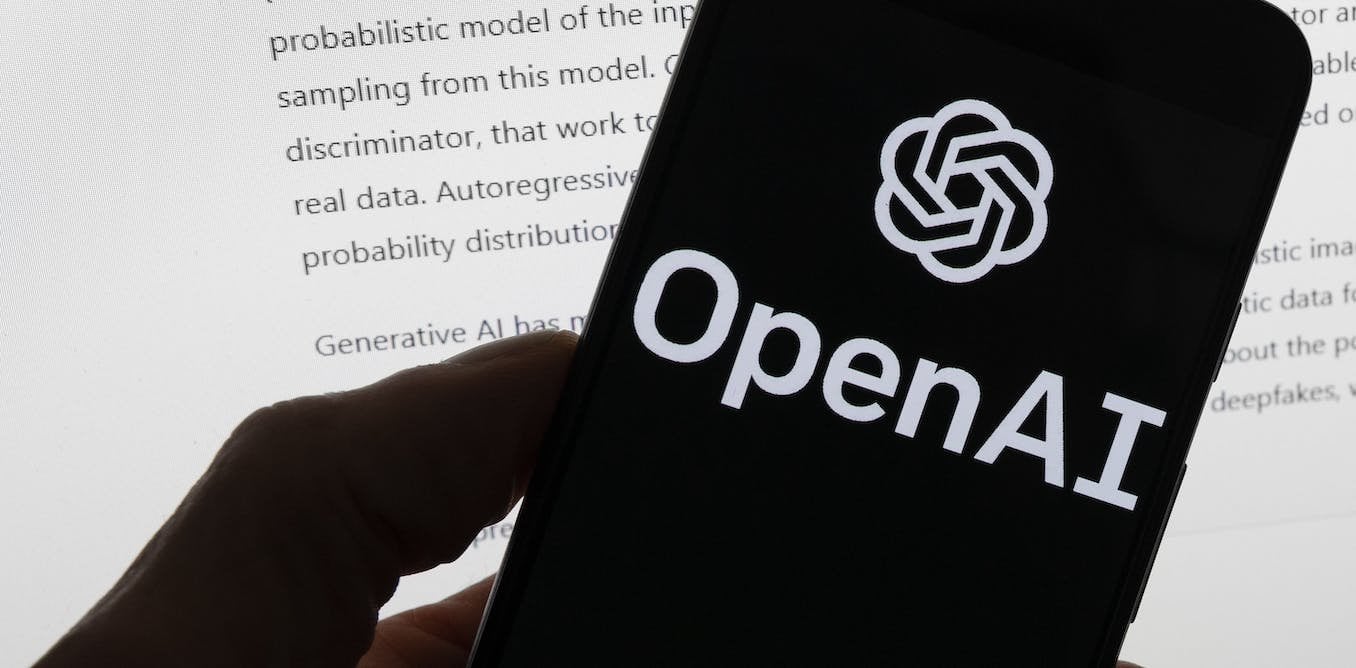FTC Probe Into OpenAI And ChatGPT: Implications For AI Regulation

Table of Contents
The FTC's Focus: Data Privacy and Misinformation Concerns
The FTC's investigation likely centers on two major areas: potential violations of consumer privacy laws and the spread of misinformation and bias facilitated by ChatGPT.
Data Privacy Violations
Concerns regarding data privacy are paramount in the FTC's probe. This includes scrutinizing how OpenAI collects, uses, and protects the vast amounts of personal data used to train ChatGPT. Specific concerns include:
- Data Collection Practices: The sheer volume of data collected to train the model raises questions about informed consent and the extent of data minimization employed. Is OpenAI collecting only necessary data, or is it gathering more than is legally permissible?
- Data Security Breaches: The potential for data breaches, exposing sensitive user information, is a significant concern. Robust security measures are crucial to protect user privacy, and the FTC is likely evaluating whether OpenAI has implemented sufficient safeguards.
- Transparency and Data Usage Policies: The lack of transparency around data usage policies is another key area under scrutiny. Are users fully informed about how their data is being used? Are the policies clear, concise, and easily accessible?
- Unauthorized Data Sharing: The FTC will investigate whether OpenAI has shared user data with third parties without proper authorization or consent, potentially violating privacy laws.
Spread of Misinformation and Bias
Another critical area of concern is the potential for ChatGPT and similar AI models to disseminate misinformation and amplify existing societal biases. This includes:
- Generation of False Information: ChatGPT's ability to generate convincing but false information poses a significant risk. The FTC is likely exploring the potential for this technology to be misused for malicious purposes, such as spreading propaganda or disinformation campaigns.
- Amplification of Bias: The training data used to develop ChatGPT might contain inherent biases, which the model can perpetuate and even exacerbate. This can lead to unfair or discriminatory outcomes, raising ethical and legal concerns.
- Difficulty in Identifying AI-Generated Content: The challenge of distinguishing AI-generated content from human-generated content adds another layer of complexity to the problem of misinformation. This makes it difficult to identify and counter the spread of false narratives.
- Impact on Public Opinion: The potential influence of biased or misleading AI-generated content on public opinion and decision-making is a significant concern for regulators.
Potential Outcomes of the FTC Investigation
The FTC investigation could lead to several different outcomes, each with significant implications for the future of AI regulation.
Enforcement Actions
Depending on the findings, the FTC could take various enforcement actions, including:
- Substantial Fines: OpenAI could face substantial financial penalties for violating consumer protection laws.
- Cease-and-Desist Orders: The FTC might issue cease-and-desist orders requiring OpenAI to make significant changes to its data collection, usage, and security practices.
- Mandatory Security Improvements: OpenAI might be mandated to implement specific data security improvements to protect user data.
- Algorithmic Changes: The FTC could require changes to ChatGPT's algorithms to mitigate the spread of misinformation and bias.
Precedent-Setting Regulations
The outcome of the FTC investigation will likely set a precedent for future AI regulation, influencing:
- Industry-Wide Standards: The investigation could spur the development of industry-wide standards for AI safety and ethics, promoting responsible AI development.
- New AI-Specific Laws: The investigation could lead to the creation of new laws and regulations specifically designed to address the unique challenges posed by AI technologies.
- Government Oversight: The FTC's actions will shape the role of government oversight in the AI sector, determining the level of intervention required to ensure responsible AI development and deployment.
- International Cooperation: The investigation's outcome could influence international cooperation on AI governance, promoting global standards for AI safety and ethics.
The Broader Implications for AI Development and Deployment
The FTC's investigation has far-reaching implications for the future of AI development and deployment.
Impact on Innovation
Increased regulation could potentially stifle innovation, but it could also encourage responsible AI development practices. A well-designed regulatory framework could foster innovation while protecting consumers and society.
The Need for Ethical Guidelines
The investigation underscores the crucial need for robust ethical guidelines and responsible AI development practices, including:
- Explainable AI (XAI): Developing AI systems that are transparent and explainable is essential for building trust and accountability.
- Bias Mitigation: Employing effective techniques to mitigate bias during the AI model training process is crucial to prevent discriminatory outcomes.
- Regular Audits and Assessments: Regular audits and assessments of AI systems are necessary to ensure compliance with ethical guidelines and legal requirements.
- Mechanisms for Redress: Establishing clear mechanisms for users to seek redress in case of harm caused by AI systems is essential.
Balancing Innovation and Safety
Finding the right balance between fostering innovation and ensuring the safe and ethical use of AI is a critical challenge for policymakers and the AI industry. This requires a collaborative approach involving governments, industry, and researchers.
Conclusion
The FTC's investigation into OpenAI and ChatGPT is a significant step toward establishing a regulatory framework for artificial intelligence. The outcome will have far-reaching implications for the future of AI development, impacting data privacy, the spread of misinformation, and the overall trajectory of innovation in this critical field. Understanding the potential outcomes of this probe is crucial for all stakeholders, from AI developers to consumers. We need to actively participate in the ongoing discussion surrounding AI regulation to shape a future where AI technologies benefit society while mitigating potential risks. The need for robust and responsible AI safety practices is paramount, and the debate around ChatGPT regulation and similar AI models will continue to evolve. Let's work together to create a future where technological advancement and ethical considerations coexist.

Featured Posts
-
 Tragedy Strikes Vancouver Festival Car Drives Into Crowd Causing Multiple Injuries
Apr 29, 2025
Tragedy Strikes Vancouver Festival Car Drives Into Crowd Causing Multiple Injuries
Apr 29, 2025 -
 Adidas Anthony Edwards 2 Unveiling The Design And Features
Apr 29, 2025
Adidas Anthony Edwards 2 Unveiling The Design And Features
Apr 29, 2025 -
 Los Angeles Wildfires The Rise Of Disaster Betting And What It Means
Apr 29, 2025
Los Angeles Wildfires The Rise Of Disaster Betting And What It Means
Apr 29, 2025 -
 Is Ai Really Thinking A Closer Look At Artificial Intelligences Cognitive Abilities
Apr 29, 2025
Is Ai Really Thinking A Closer Look At Artificial Intelligences Cognitive Abilities
Apr 29, 2025 -
 Buying Tickets For The Capital Summertime Ball 2025
Apr 29, 2025
Buying Tickets For The Capital Summertime Ball 2025
Apr 29, 2025
Latest Posts
-
 Nba Playoffs Magic Johnson Weighs In On Knicks Pistons Series
May 12, 2025
Nba Playoffs Magic Johnson Weighs In On Knicks Pistons Series
May 12, 2025 -
 Knicks Vs Pistons Magic Johnsons Bold Playoff Prediction
May 12, 2025
Knicks Vs Pistons Magic Johnsons Bold Playoff Prediction
May 12, 2025 -
 Zeygaria Kai Imerominies Agonon Nba Playoffs 2024
May 12, 2025
Zeygaria Kai Imerominies Agonon Nba Playoffs 2024
May 12, 2025 -
 Magic Johnson Predicts The Winner Knicks Vs Pistons Playoffs
May 12, 2025
Magic Johnson Predicts The Winner Knicks Vs Pistons Playoffs
May 12, 2025 -
 Nba Playoffs Pliris Enimerosi Gia Zeygaria Kai Agones
May 12, 2025
Nba Playoffs Pliris Enimerosi Gia Zeygaria Kai Agones
May 12, 2025
